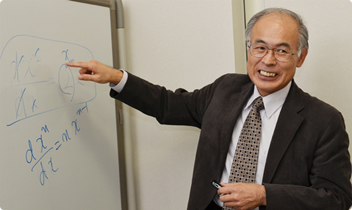Our Mathematical Analysis Department started with just three members.
We nurture researchers' confidence while enhancing knowledge and technology.

Tell us about your department of mathematical analysis.
It was created in 1997. I was its first manager. The department is designed to conduct studies of algorithms – the platforms of programming – as well as a variety of other structural analyses. Our main task is to support development, so it is quite rare that our achievements are made public. The department started with only three members, but now totals 25, which testifies to the great contribution it makes to the company.
Besides its day-to-day tasks, the department provides seminars and group study, doesn't it?
Yes. These efforts are intended to pass on basics and nurture interest in mathematical analysis. Seminars have been held four to five times a year over two consecutive years in the past. The adaptive range of mathematical analysis is wide. What's important is to nurture interest and understand the essence, rather than simply learning knowhow.
Nurturing environments where young researchers can work comfortably.
How do you nurture young researchers who are studying mathematical analysis?
Our department work is mostly unprecedented. Once a young researcher becomes intimidated thinking, "No, I cannot make it. What can I do?" the pressure is very high. I sometimes try to encourage such younger researchers, saying, "Don't worry. You can do it," but such encouragement may not help, only increasing their stress. So, instead, I have been trying to build an environment where they can work in a more relaxed way, telling them, "There will always be a way to break through tomorrow, even if you fail today."
Releasing researchers from pressures will help them achieve success?
When their worries are lifted, it happens quite often that the researchers accomplish the mission with better results than I had expected. Such occasions make me very happy.
